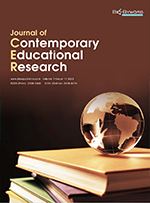Analyzing the Influences on Women’s Upbringing and Their Educational Significance Using the Case of Estella, the Heroine of Great Expectations
Abstract
This paper explores the influences on women’s upbringing and their educational significance by using the character Estella from Great Expectations as a case study. Through analyzing the impact of social environment, family education, and self-awakening, this article aims to promote gender equality and the construction of a feminist cognitive community. It delves into the class divisions of 19th-century England, the manipulative family education imposed on Estella by Miss Havisham, and Estella’s journey towards self-consciousness after her foster mother’s death. The study highlights the challenges faced by women in societal constraints, family expectations, and the importance of self-discovery in overcoming these limitations.
References
George T, Mielicki MK, Wiley J, 2023, Great Expectations: Misleading Effects of Images in the Alternate Uses Task. Psychology of Aesthetics, Creativity, and the Arts, 17(1): 56–67. http://doi.org/10.1037/aca0000380
Tsai N, Buschkuehl M, Kamarsu S, et al., 2018, (Un)great Expectations: The Role of Placebo Effects in Cognitive Training. Journal of Applied Research in Memory and Cognition, 7(4): 564–573. http://doi.org/10.1037/h0101826
Barlow M, Woodman T, Hardy L, 2013, Great Expectations: Different High-Risk Activities Satisfy Different Motives. Journal of Personality and Social Psychology, 105(3): 458–475. http://doi.org/10.1037/a0033542
Shea CM, Malone MFT, Griffith JA, et al., 2023, Please Feel Free to Intervene: A Longitudinal Analysis of the Consequences of Bystander Behavioral Expectations. Journal of Diversity in Higher Education, 16(4): 486–496. http://doi.org/10.1037/dhe0000348
Hutchison KA, Neely JH, Johnson JD, 2001, With Great Expectations, Can Two “Wrongs” Prime A “Right”? Journal of Experimental Psychology: Learning, Memory, and Cognition, 27(6): 1451–1463. http://doi.org/10.1037/0278-7393.27.6.1451
Vertsberger D, Knafo-Noam A, 2019, Mothers’ and Fathers’ Parenting and Longitudinal Associations with Children’s Observed Distress to Limitations: From Pregnancy to Toddlerhood. Developmental Psychology, 55(1): 123–134. http://doi.org/10.1037/dev0000622
Henning G, Ehrlich U, Gow AJ, et al., 2023, Longitudinal Associations of Volunteering, Grandparenting, and Family Care with Processing Speed: A Gender Perspective on Prosocial Activity and Cognitive Aging in the Second Half of Life. Psychology and Aging. http://doi.org/10.1037/pag0000780
Affleck MK, Steed LG, 2001, Expectations and Experiences of Participants in Ongoing Adoption Reunion Relationships: A Qualitative Study. American Journal of Orthopsychiatry, 71(1): 38–48. http://doi.org/10.1037/0002-9432.71.1.38
Priniski SJ, Rosenzweig EQ, Canning EA, et al., 2019, The Benefits of Combining Value for the Self and Others in Utility-Value Interventions. Journal of Educational Psychology, 111(8): 1478–1497. http://doi.org/10.1037/edu0000343
Wolf W, 2023, ‘Writing Facts’ and 19th-Century English Realist Fiction: Theoretical Reflections and the Com-plexity of the Relationship in Charles Dickens’ Hard Times, and George Eliots’ Adam Bede, in Writing Facts: Interdisciplinary Discussions of a Key Concept in Modernity, Transcript Publishing, Bielefeld, Germany, 163–190.
MacMillan LN, 2022, The Afterlife of Charles Dickens: His Posthumous Impact on Nineteenth-Century Spiritualism. Dickens Studies Annual: Essays on Victorian Fiction, 53(2): 271–282.
Buckland A, 2021, Charles Dickens, Man of Science. Victorian Literature and Culture, 49(3): 423–455.

